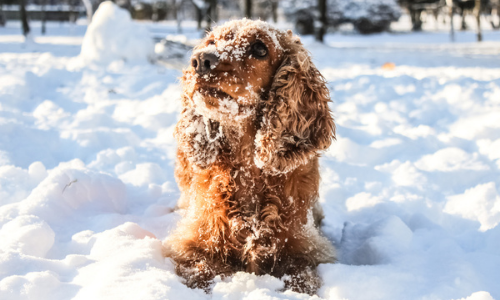
How to Protect Your Pet When the Weather Turns Cold
Cold weather can be dangerous for your pet's health, causing ailments ranging from skin irritations to frostbite. These six tips will help you keep your pet safe and comfortable no matter how low the temperature drops.
1. Use Pet-Safe Antifreeze
Antifreeze may not look very appetizing to you, but animals are drawn to its sweet scent. Licking a small puddle of antifreeze can cause kidney failure and even death in pets. Since you never know when your radiator will spring a leak, it's a good idea to replace your antifreeze with a pet-safe version.
Before adding pet-safe antifreeze, flush out the old antifreeze and dispose of it. If you just top off the antifreeze with the pet-safe type, your pet may still be at risk. Wipe up antifreeze spills and puddles immediately to protect your pet and other animals.
2. Pay Extra Attention to Your Pet's Paws and Pads
Frozen surfaces, rock salt, and ice-melting chemicals can be hard on your pet's paws. Wipe off your pet's paws after every walk or outdoor play session to prevent painful irritation. Applying a liberal coat of petroleum jelly to your dog or cat's paws before going outside can be a good preventative measure.
Pet-sized boots and booties offer another option. The footwear prevents paws and pads from coming in contact with dangerous substances and also reduces slips and falls on icy surfaces.
Paw inspections are particularly important on snowy or icy days. Remove clumps of snow and ice stuck between your pet's toes promptly to prevent irritation or frostbite.
3. Limit Outside Time on Freezing Cold Days
Your pet's natural fur coat makes chilly days more comfortable but may not offer adequate protection on very cold days. If it's so cold that you don't want to spend more than a few minutes outside, bring your pet inside. Although dog houses can provide some degree of shelter from the wind, your pet will still be affected by the cold and could develop frostbite if left outside for too long.
Some dogs will be more comfortable wearing sweaters when venturing out on cold days. A sweater may be a good idea for short-haired or hairless pets, old, young, frail, or sick animals.
4. Make Sure Your Pet Wears Tags
It's never a good time to lose your pet, but the winter is a particularly bad time for your furry friend to go missing. Bad weather can complicate your search and put your pet's life in jeopardy. A collar with a tag may decrease the amount of time your lost pet spends outdoors before it's reunited with you.
Put an ID tag on your dog or cat even if your pet is microchipped. Veterinary offices and shelters will have microchip readers, but good samaritans won't have these devices.
5. Protect Your Pet from Indoor Hazards
It only takes a second for an injury to occur if your pet is near a fireplace, heater, or lit candle. Place a baby gate enclosure around your fireplace or heater to prevent your pet from wandering too close. Sparks from the fire can cause burns, as can a brush with a heater.
If you use a kerosene heater, it's particularly important to keep the unit away from your pets. Your playful dog or cat could knock over the heater, starting a fire. Battery-operated flameless candles are a better choice if you have a curious cat or dog. The candles provide all the ambiance of the real thing, yet don't pose a fire hazard.
6. Don't Leave Your Pet in a Cold Car
Most people know that hot cars can quickly kill pets and children during the summer months. Unfortunately, cold cars are just as dangerous. The ASPCA notes that cars tend to hold in the cold, acting as refrigerators. If you'll be out of the car for more than 10 minutes, bring your pet with you or better yet, leave it at home.
Do you have a question about your pet's health or need to schedule an appointment? Contact our office and let us know how we can help you.
Sources:
ASPCA: Cold Weather Safety Tips
WebMD: Pet Winter Safety: Prepping Your Pet for Winter Weather
American Veterinary Medical Association: Cold Weather Animal Safety
